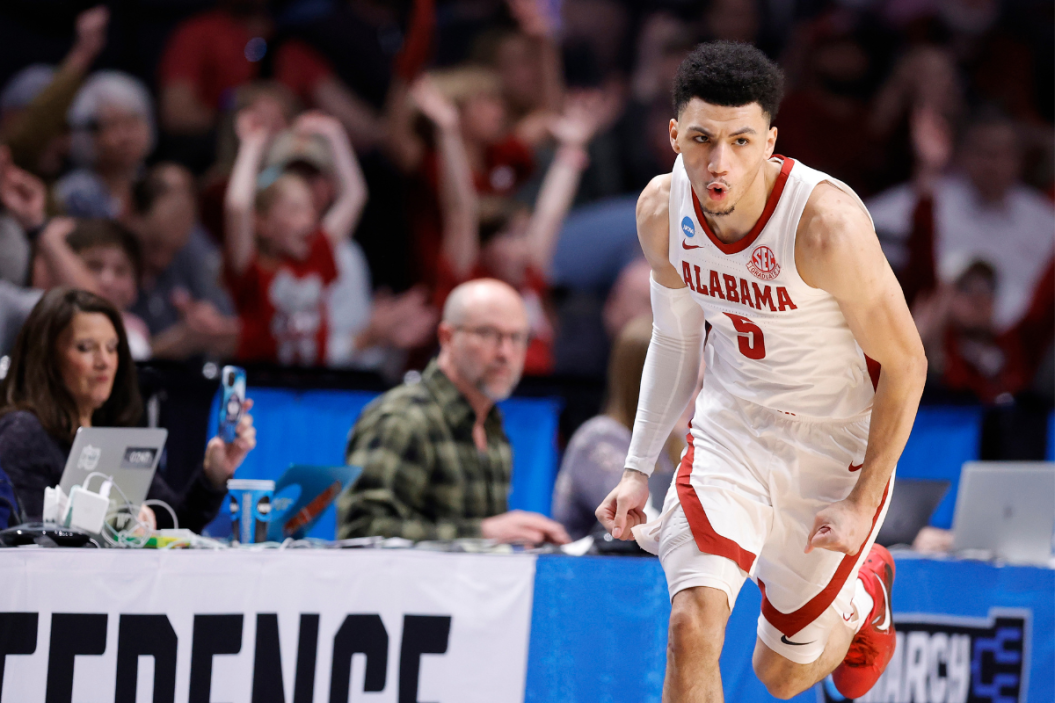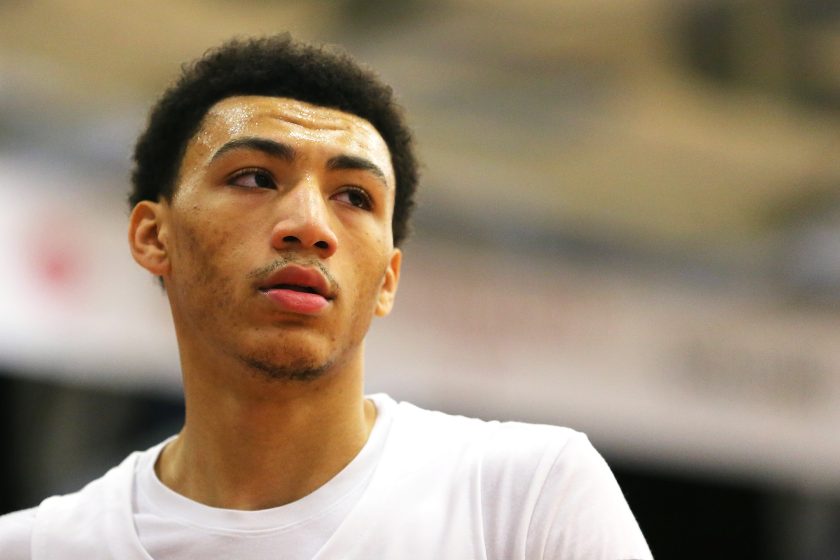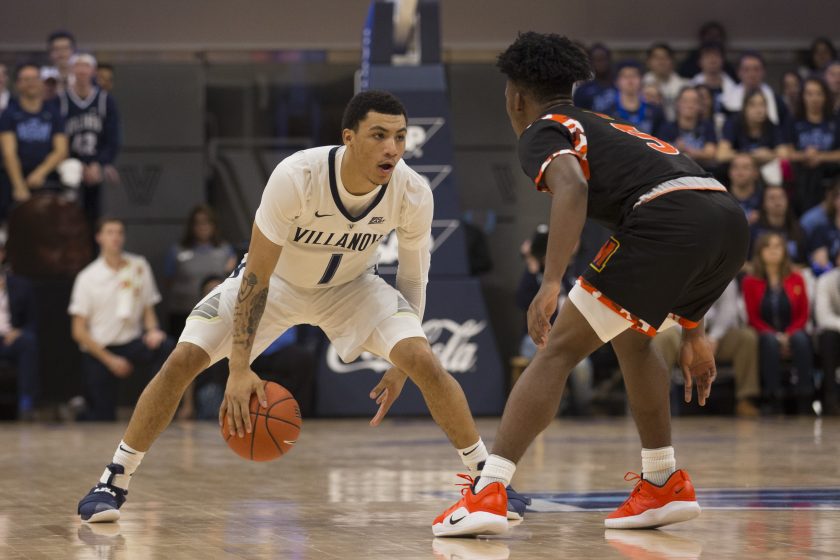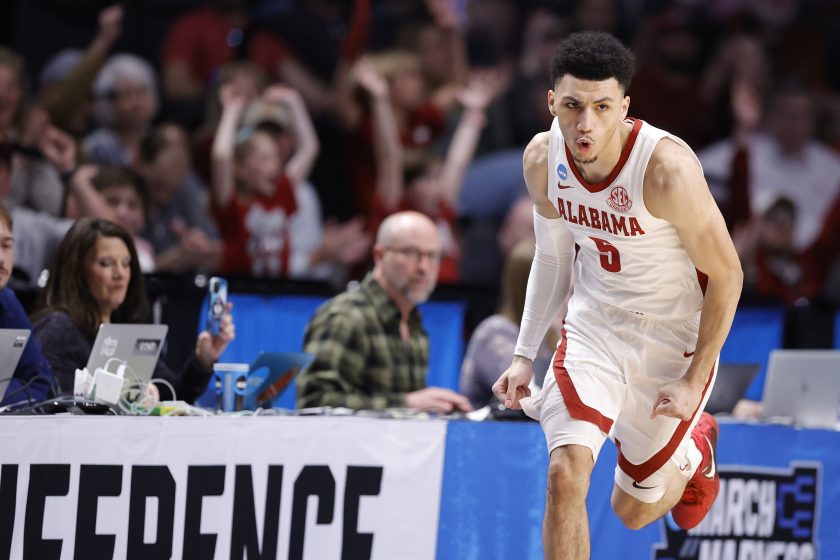When he suited up for Hudson Catholic Regional High School in New Jersey, anyone who followed prep basketball on a consistent basis knew future Alabama guard Jahvon Quinerly was one of the best point guards in the country. The 6-foot-1 floor general was simply fearless and knew how to make his teammates better. Any college basketball team would have been lucky to sign him.
Videos by FanBuzz
Originally, it was the Arizona Wildcats and head coach Sean Miller who landed the 2018 McDonald's All-American back in August 2017. The move wasn't overly surprising at the time, but the five-star recruit's life quickly turned into a nightmare.
From being linked to an FBI probe to limited playing time at Villanova to transferring and getting denied to play immediately for Alabama, Quinerly and his family have been through it all, which makes a Sweet 16 berth in the 2023 NCAA Men's Division I Basketball Tournament a fitting end to his career.
The Recruiting Scandal
Photo by Adam Glanzman/Getty Images
Just three weeks after the big commitment, Arizona assistant coach Emanuel "Book" Richardson — the primary recruiter for Quinerly — was arrested in part of an FBI probe into corruption in college basketball.
A wiretap phone call, as reported by AZCentral.com, was recorded between Richardson and Christian Dawkins — a fired sports agent for ASM Sports — to discuss paying a recruit to play for Arizona. Later, Dawkins told an undercover agent about another $15,000 to help secure a player identified as a "top point guard in the country."
As a result, Quinerly de-committed from Arizona, and Richardson was eventually sentenced to three months at Otisville federal prison.
In 2022, the NCAA issued a 10-year show cause penalty, effectively keeping him from coaching in college basketball for a decade.
Jahvon Quinerly Chooses Villanova
Photo by Mitchell Leff/Getty Images
After the dust cleared from the FBI probe, Quinerly — the two-time New Jersey Gatorade Player of the Year — committed to play for Jay Wright and the Villanova Wildcats over the Oklahoma Sooners.
Everyone thought Quinerly would be an instant impact replacement of point guard Jalen Brunson, the National Player of the Year who led the Wildcats to the 2018 National Championship and went to the NBA. However, that was far from the case.
For most of the 2018-19 season in Big East play, the Hackensack, New Jersey native barely saw the floor and even had a controversial Instagram story midway through his freshman campaign.
Quinerly averaged just 3.2 points and only 9.1 minutes per game in 25 games and transferred following the season.
Next Up: Newly Hired Nate Oats and Alabama
Photo by Alex Slitz/Getty Images
It didn't take long for Jahvon Quinerly to find a new home with the Crimson Tide in Tuscaloosa to play for newly-hired head coach Nate Oats in 2019.
The hope was for Quinerly to play right away for Alabama basketball and was originally denied in October. Then, the NCAA denied the point guard's appeal for a waiver for immediate eligibility in November 2019 and he sat out the entire 2019-20 season.
Needless to say, Alabama athletic director Greg Byrne and Oats were upset at the decision in a joint statement.
"We can't begin to express how disappointed we are with this decision. Jahvon and his family have been through a set of circumstances that no student-athlete in the history of the NCAA has experienced. Their name has been falsely dragged through the mud for two years, and we felt confident that the NCAA Committee for Legislative Relief would recognize this very unique set of circumstances. We will continue to support Jahvon and his family in every way that we can."
Quinerly's mother wasn't too happy, either.
"[Jahvon] thought we had a chance for a min, hoping our story would be heard. But we both knew it was bs. Shit, The NCAA scours through my bank statements dated back to 2015 from before I met Book & questions $10 Venmo transactions why would we ever think this could go our way," Quinerly's mother posted on Twitter. "It's time to start talking about this circumstance and this organization & yes why Villanova was not his FIRST choice & why his parents made his decision 4 him! Why? Well stick around and you'll find out. I'm done being quiet. I've stayed under the radar FTS."
So, why couldn't Quinerly play right away?
The NCAA's Inconsistent Transfer Rule
Now, Quinnerly will play as a 24-year old, redshirt senior. For what purpose? The NCAA’s transfer policy is an unholy, unjustifiable mess. If Quinnerly played softball or all but five other sports, he could transfer at semester and be immediately eligible. https://t.co/tju0iA1kGJ
— Jay Bilas (@JayBilas) November 12, 2019
Under the old rules that have since been changed in the transfer portal era, players that weren't graduate transfers needed the NCAA's approval to transfer and play immediately. Here's what the old rules stated regarding transferring, as outlined by NCAA.org:
— You are transferring to a Division II or III school, or you are transferring to a Division I school in any sport other than baseball, men's or women's basketball, football (Football Bowl Subdivision) or men's ice hockey. If you are transferring to a Division I school for any of the previously-listed sports, you may be eligible to compete immediately if you were not recruited by your original school and you have never received an athletics scholarship.
— You are academically and athletically eligible at your previous four-year school.
— You receive a transfer-release agreement from your previous four-year school.
For all intents and purposes, Quinerly seemed to have met the requirements to play college basketball right away at Alabama. Yet, for whatever reason, he was denied twice. Although this is just one example and an isolated case, there's no denying Quinerly got the raw end of the deal here.
Kansas transfer Quentin Grimes didn't have to sit out that same season at Houston. Kentucky transfer Quade Green only sat out the spring semester after transferring to Washington in the middle of that season. Both of these players were former McDonald's All-Americans. Both were allowed to play right away at their new school.
So why not Quinerly? Was it because of past allegations? Was it simply because the NCAA didn't want to do it?
It's clear Jahvon Quinerly fell victim to the NCAA's inconsistent model, but everything has worked out for the 24-year-old redshirt senior. Quinerly scored 22 points against Maryland in Alabama's second-round March Madness matchup. His Alabama Crimson Tide team is in the Sweet 16 with their sights set on a national championship.





